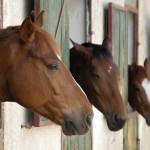Dietary Omega-3 Fatty Acids Improve Airway Function in Horses

Horses that are sensitive to the fine airborne particles from hay, dust, and mold spores may develop chronic inflammatory airway disease if they are exposed to high concentrations of these contaminants.
According to equine nutritionist Kathleen Crandell, Ph.D., of Kentucky Equine Research (KER), the most successful treatment for airway inflammation is to turn horses out to pasture instead of keeping them in stalls where they are in constant contact with airborne dust. If turnout is not possible or practical, Crandell says there are various management measures that can be taken to reduce the level of dust exposure. These steps include using a low-dust bedding material such as newspaper; dampening or soaking hay before feeding; and providing excellent ventilation throughout the stable.
Recent research has discovered another management practice that can be beneficial to stalled horses suffering from inflammatory airway disease. In a study conducted at the Purdue University College of Veterinary Medicine, 43 horses with airway inflammation were fed a complete pelleted diet but were not given hay. The horses were placed in three trial groups and were given 30 grams or 60 grams per day of an omega-3 fatty acid supplement, or 30 grams of a placebo. After two months, all horses were evaluated for lung function, clinical signs of airway inflammation, and types of cells recovered from bronchoalveolar lavage fluid.
Though improvement was seen in all horses at the end of the trial period, the greatest improvements were seen in horses supplemented with omega-3 fatty acids. Supplemented horses showed a 60% improvement in cough scores, a 48% decrease in respiratory effort, and a decrease from 23% before treatment to 9% after treatment in the level of neutrophils in bronchoalveolar lavage fluid.
In comparison, horses given a placebo showed smaller gains of 33% improvement in cough score and a 27% decrease in respiratory effort. Placebo horses had an increase in neutrophils in bronchoaleolar lavage fluid from 11% before treatment to 17% after the trial.
Overall improvement could be expected because hay was replaced with a complete pelleted diet. Increased improvement in the horses supplemented with omega-3 fatty acids, such as those found in EO-3, could be attributed to the ability of these acids to modulate inflammatory responses within cells. Developed by KER, EO-3 is a palatable product delivering potent marine-derived oil that is rich in omega-3 fatty acids.








